The structure of a protein reveals a lot about its function. This means, the more precisely the three-dimensional protein structure is known, the better the conclusions on its function can be drawn. Using NMR spectroscopy, Prof. Sebastian Hiller from the Biozentrum, University of Basel, has gained unique insights into architectures and functions as well as into interactions and dynamics of proteins. For his outstanding achievements, the structural biologist has now been honored with the ICMRBS Founder’s Medal, one of the most important awards in his field. "This recognition is a great acknowledgement of the intensive work of my young research group. It shows that our research is competitive on an international level, which strongly motivates us."
NMR spectroscopy is a very powerful analytical method to obtain detailed information on structure, function, and dynamics of molecules. Through continuous development of the NMR technology, Hiller has been able to solve the structure and function of complex proteins at the atomic level. He has elucidated how specific proteins are integrated into the cell membrane, deciphered the mode of action of proteins that play a role in the innate immune response and revealed the dynamics of chaperone-protein interactions. Chaperones are helper proteins that support other proteins to fold into their correct 3D structure. His numerous publications in high-ranking journals reflect not only Hiller's successful research but also his fruitful collaborations with scientists from other disciplines.
Since 2010, Sebastian Hiller has been working as Professor of Structural Biology at the Biozentrum of the University of Basel, initially as SNSF Professor and, since 2015, as Associate Professor. After completing his studies at the ETH Zurich, he obtained his PhD in the laboratory of the Nobel Laureate Prof. Kurt Wüthrich. He subsequently carried out postdoctoral research at Harvard Medical School, Boston, as well as the ETH Zurich. Already in 2011, Hiller was awarded a prestigious European Research Council (ERC) Starting Grant for his research and, in 2014, he became a Young Investigator of the European Molecular Biology Organization (EMBO).
Since the initial meeting in 1964, the ICMRBS organizes biennial conferences on new developments and progresses in the field of magnetic resonance spectroscopy in biological systems. In 2002, the ICMRBS established the Founder’s Medal to recognize young scientists for their exceptional contributions.
Contact: Communications, Katrin Bühler



